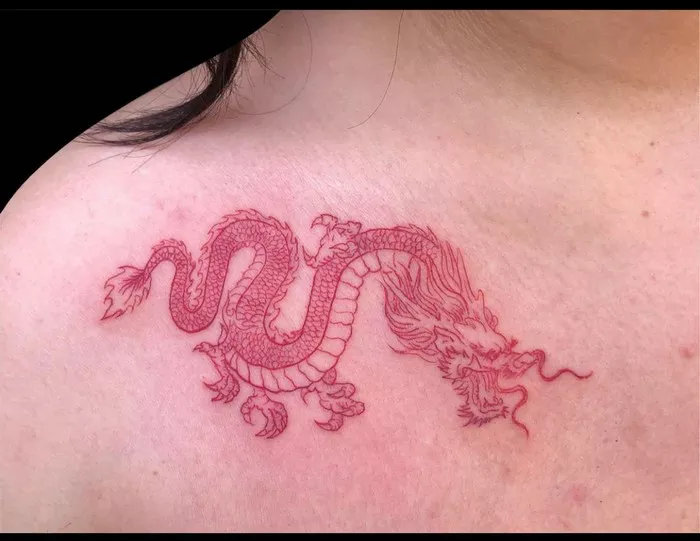Chinese New Year is a time of celebration, renewal, and reflection. Among the various symbols associated with this festival, the dragon holds a prominent place in Chinese culture. Known for its strength, wisdom, and auspiciousness, the dragon has become a popular motif in tattoos, particularly around the time of the New Year. This article explores the significance of Chinese New Year dragon tattoos, delving into their meanings, designs, and cultural importance.
Understanding the Dragon in Chinese Culture
The Symbolism of the Dragon
In Chinese culture, the dragon is a powerful symbol representing various virtues:
Strength and Power: The dragon is often viewed as a powerful creature, embodying strength and authority.
Wisdom and Intelligence: It is associated with wisdom, knowledge, and the ability to navigate life’s challenges.
Good Luck and Prosperity: Dragons are considered bringers of good fortune, particularly in agricultural settings where they are linked to rain and fertility.
Historical Context
The dragon has deep historical roots in Chinese mythology and folklore. It is often depicted as a celestial being that controls water and weather, and it features prominently in many myths. The Chinese dragon differs significantly from Western depictions; it is seen as a benevolent creature, often linked to the emperor and imperial power.
The Dragon in Chinese New Year Celebrations
The Role of the Dragon in Festivities
During Chinese New Year, dragons symbolize renewal and the promise of a prosperous year ahead. They are featured in various traditional celebrations, including:
Dragon Dances: Colorful dragon dances are performed in parades, showcasing the dragon’s grace and majesty. Participants manipulate a long, flexible dragon figure, representing the fluidity and strength of the creature.
Decorations: Dragon motifs are commonly used in decorations during the New Year, adorning homes, streets, and public spaces to attract good fortune.
Cultural Significance
The dragon serves as a bridge between the earthly and the divine, connecting people with their heritage and traditions. It symbolizes the hope for a successful year filled with happiness and abundance.
The Meaning of Dragon Tattoos
Personal Significance
For many individuals, getting a dragon tattoo can carry personal meanings, such as:
Resilience: The dragon can represent personal strength and the ability to overcome adversity.
Transformation: Just as the dragon is a symbol of change and renewal during the New Year, a tattoo may signify an individual’s own transformation or new beginning.
Cultural Pride: For those of Chinese descent or with an appreciation for Chinese culture, a dragon tattoo can be a way to honor their heritage and express pride in their identity.
Aesthetic Appeal
Dragon tattoos are also popular for their striking visual impact. With intricate designs and vibrant colors, they can be customized to reflect an individual’s style and personality. The dragon’s graceful curves and fierce expression can create a stunning piece of art on the skin.
Common Designs of Chinese New Year Dragon Tattoos
Traditional Styles
Dragon tattoos can vary in style, from traditional to modern interpretations. Common elements include:
Color Choices: Red and gold are often favored in traditional designs, symbolizing good luck and wealth.
Patterns: Scales, flames, and clouds are frequently incorporated to enhance the dragon’s celestial qualities.
Placement
The placement of a dragon tattoo can also hold significance. Popular locations include:
Back: A large, intricate design can span the entire back, making a bold statement.
Arms: Sleeve tattoos featuring dragons can wrap around the arm, showcasing movement and energy.
Chest: A chest tattoo allows for a prominent display of the dragon’s power and majesty.
Cultural Appropriateness
Respecting Tradition
While dragon tattoos can be a beautiful expression of personal significance, it’s essential to approach them with respect for their cultural origins. Understanding the dragon’s role in Chinese mythology and New Year celebrations can help ensure that the tattoo is meaningful rather than merely decorative.
Avoiding Misinterpretation
Individuals considering a dragon tattoo should be mindful of the nuances within Chinese culture. Using symbols without understanding their significance can lead to cultural misappropriation. Engaging with knowledgeable sources and exploring the deeper meanings can foster appreciation and respect.
Care and Maintenance of Dragon Tattoos
Healing Process
After getting a tattoo, proper care is crucial to ensure optimal healing and vibrancy:
Keep it Clean: Clean the tattoo gently with mild soap and water.
Moisturize: Apply a fragrance-free moisturizer to keep the skin hydrated.
Avoid Sun Exposure: Protect the tattoo from the sun to prevent fading.
Long-Term Care
To maintain the tattoo’s appearance over time:
Use Sunscreen: Regular application of sunscreen can protect the tattoo from UV rays.
Moisturize Regularly: Keeping the skin moisturized helps maintain the vibrancy of the colors.
Conclusion
Chinese New Year dragon tattoos are rich in meaning, encompassing strength, wisdom, and cultural pride. As symbols of good fortune and transformation, they resonate deeply with individuals seeking to honor their heritage or represent personal resilience. When approached with respect and understanding, these tattoos can serve as powerful expressions of identity and celebration.
Whether through the intricate designs or the cultural stories they embody, dragon tattoos continue to captivate and inspire those who wear them. As you consider a dragon tattoo, remember to reflect on its significance and the legacy it represents—both personally and culturally.
Related topics:

